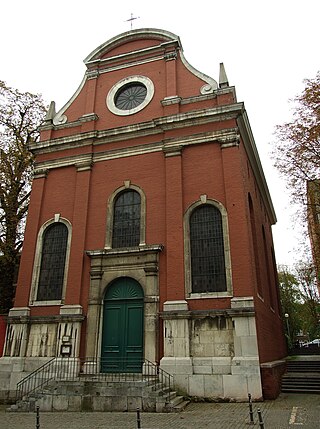Self-guided Sightseeing Tour #8 in Aachen, Germany
Legend
Tour Facts
5.4 km
141 m
Experience Aachen in Germany in a whole new way with our free self-guided sightseeing tour. This site not only offers you practical information and insider tips, but also a rich variety of activities and sights you shouldn't miss. Whether you love art and culture, want to explore historical sites or simply want to experience the vibrant atmosphere of a lively city - you'll find everything you need for your personal adventure here.
Individual Sights in AachenSight 1: Ludwig Forum für Internationale Kunst
The Ludwig Forum for International Art is a museum for modern art in Aachen. It is based on the Ludwig Collection, which was brought together by the Aachen collector couple Irene and Peter Ludwig, and is supported by the Peter and Irene Ludwig Foundation.
Wikipedia: Ludwig Forum für Internationale Kunst (EN), Website
Sight 2: STAWAG Stadtwerke Aachen AG
STAWAG – Stadt- und Städteregionswerke Aachen AG is the municipal utility of the city of Aachen and offers services in the areas of gas, district heating, water and electricity. This includes supplying the population of Aachen with gas, water, electricity and heat as well as advising and providing customer service for the use of energy in households and industry. The group is a subsidiary of Energieversorgungs- und Verkehrsgesellschaft Aachen mbH (E.V.A.), which also has other subsidiaries.
Sight 3: Kongreßdenkmal
The Congress Monument is an architectural monument commemorating the Monarchs' Congress in Aachen in 1818, which was erected in the years 1836 to 1844 according to designs by the state building inspector Johann Peter Cremer from 1822 and Karl Friedrich Schinkel and Cremer from 1837 at a historic site on Adalbertsteinweg, dismantled in 1914 and moved to the Aachen City Garden in 1928.
Sight 4: Friedhof Güldenplan
The city garden Aachen with the central and 193 m above sea level. NHN Hohen Wingertsberg is a landscape architecturally designed urban park in Aachen. He consists of the hospital garden, which was transformed into a spa park from 1916 in 1852, as well as the Farwickpark, which was followed north and, which has been released since 1945, and the former Güldenplan, which was incorporated after 1945. The city garden has a total area of around 2.3 ha and is located in the area between Monheimsallee, Jülich Strasse, Robensstraße, Passstraße and Rolandstrasse.
Sight 5: Neues Kurhaus
The New Kurhaus in Aachen, built between 1914 and 1916, is a neoclassical building in Aachen, Germany. The Kurhaus is located on the edge of Aachen's Stadtgarten on Monheimsallee and has the location designation Monheimsallee 44. The building is a listed building.
Sight 6: Sandkaulpark

The Sandkaulpark is the second largest park within the Aachen Alleenring after the Elisengarten. It was one of the few inner-city areas to be laid out in Aachen after the war by the so-called alignment line straightening. The residential buildings at the time, which were largely bomb-damaged, were demolished. The park is located within the monument area of protection zone B.
Sight 7: Hotmannspief
The Hotmannspief, also Hotmannspiif, is a fountain monument at the historic fountain site in Aachen, which was erected in 1825 according to designs by city architect Adam Franz Friedrich Leydel in the form of an obelisk and provided with figures in 1830.
Sight 8: St. Peter
St. Peter's Church is a church in Aachen, Germany, named after St. Peter. It is located in the city center in the immediate vicinity of the bus station. The church is one of the oldest monuments in Aachen.
Sight 9: Theresienkirche
The Theresienkirche is a Catholic city church in Aachen, Germany. It is located in the northeastern area of the city center and borders on the building areas of the RWTH Aachen University. It is owned by the state of North Rhine-Westphalia as a special property.
Sight 10: Archäologisches Fenster Barbarossamauer
The Archaeological Windows in Aachen are showcases or viewing windows in the public space of Aachen's old town or in buildings that are at least temporarily open to the public or visible, in which historically important archaeological finds from Aachen's city history can be viewed at the place where they were found.
Sight 11: Heilig-Kreuz
Heilig Kreuz is a church in Aachen, Germany. It was consecrated in 1902 and is located in the Pontviertel, a northern area of the city on Pontstraße near the former city gate Ponttor. This means that it is in the immediate vicinity of the buildings of the RWTH Aachen University.
Sight 12: Ehrenmal
The Marienturm was a defensive tower of the outer city wall of the city of Aachen, which was built between 1300 and 1350. It is one of the few surviving towers of the former city fortifications and is one of the architectural monuments of the city of Aachen.
Sight 13: K.D. St.V. Franconia Aachen

The Catholic German Student Fraternity Franconia zu Aachen im CV is a Catholic, German, color-bearing student fraternity at RWTH Aachen University, which provided the cathedral guard of Aachen Cathedral. She belongs to the Cartellverband (CV).
Sight 14: Ehemalige Klosterkirche der Karmelitinnen
The convent of the Discalced Carmelite Sisters (OCD) in Aachen has existed since 1662 and has been dissolved several times and rebuilt in various places in the city.
Share
How likely are you to recommend us?
Disclaimer Please be aware of your surroundings and do not enter private property. We are not liable for any damages that occur during the tours.
GPX-Download For navigation apps and GPS devices you can download the tour as a GPX file.










